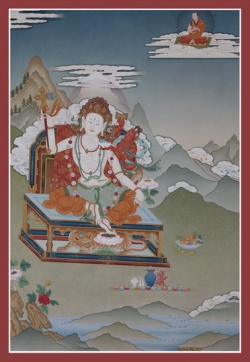Difference between revisions of "Sâdhaka"
(Created page with "thumb|250px| In the dharmic religions, a sādhaka (Sanskrit: साधक) is someone who follows a particular sādhanā, or ...") |
m (Text replacement - "{{Wiki|related}}" to "related") |
||
| Line 1: | Line 1: | ||
[[File:Sureshana038.jpg|thumb|250px|]] | [[File:Sureshana038.jpg|thumb|250px|]] | ||
| − | In the [[dharmic]] [[religions]], a [[sādhaka]] ([[Sanskrit]]: [[साधक]]) is someone who follows a particular [[sādhanā]], or a way of [[life]] designed to realize the goal of one's [[Wikipedia:Absolute (philosophy)|ultimate]] {{Wiki|ideal}}, whether it is merging with [[brahman]] or [[realization]] of one's [[personal deity]]. The [[word]] is | + | In the [[dharmic]] [[religions]], a [[sādhaka]] ([[Sanskrit]]: [[साधक]]) is someone who follows a particular [[sādhanā]], or a way of [[life]] designed to realize the goal of one's [[Wikipedia:Absolute (philosophy)|ultimate]] {{Wiki|ideal}}, whether it is merging with [[brahman]] or [[realization]] of one's [[personal deity]]. The [[word]] is related to the [[Sanskrit]] [[sādhu]], which is derived from the verb [[root]] [[sādh]]-, '[[to accomplish]]'. As long as one has yet to reach the goal, they are a [[sādhaka]], while one who has reached the goal is called a[[ siddha]]. In {{Wiki|modern}} usage, [[sadhaka]] is often applied as a generic term for any [[religious]] [[practitioner]]. In {{Wiki|medieval}} times it was more narrowly used as a technical term for one who had gone through a specific [[initiation]]. |
[[Hindu]], [[Jain]], and [[Vajrayana]] [[Buddhist traditions]] use the term [[sadhaka]] for [[spiritual]] initiates and/or aspirants . | [[Hindu]], [[Jain]], and [[Vajrayana]] [[Buddhist traditions]] use the term [[sadhaka]] for [[spiritual]] initiates and/or aspirants . | ||
{{W}} | {{W}} | ||
[[Category:Buddhist Terms]] | [[Category:Buddhist Terms]] | ||
Latest revision as of 15:45, 31 December 2014
In the dharmic religions, a sādhaka (Sanskrit: साधक) is someone who follows a particular sādhanā, or a way of life designed to realize the goal of one's ultimate ideal, whether it is merging with brahman or realization of one's personal deity. The word is related to the Sanskrit sādhu, which is derived from the verb root sādh-, 'to accomplish'. As long as one has yet to reach the goal, they are a sādhaka, while one who has reached the goal is called asiddha. In modern usage, sadhaka is often applied as a generic term for any religious practitioner. In medieval times it was more narrowly used as a technical term for one who had gone through a specific initiation. Hindu, Jain, and Vajrayana Buddhist traditions use the term sadhaka for spiritual initiates and/or aspirants .
